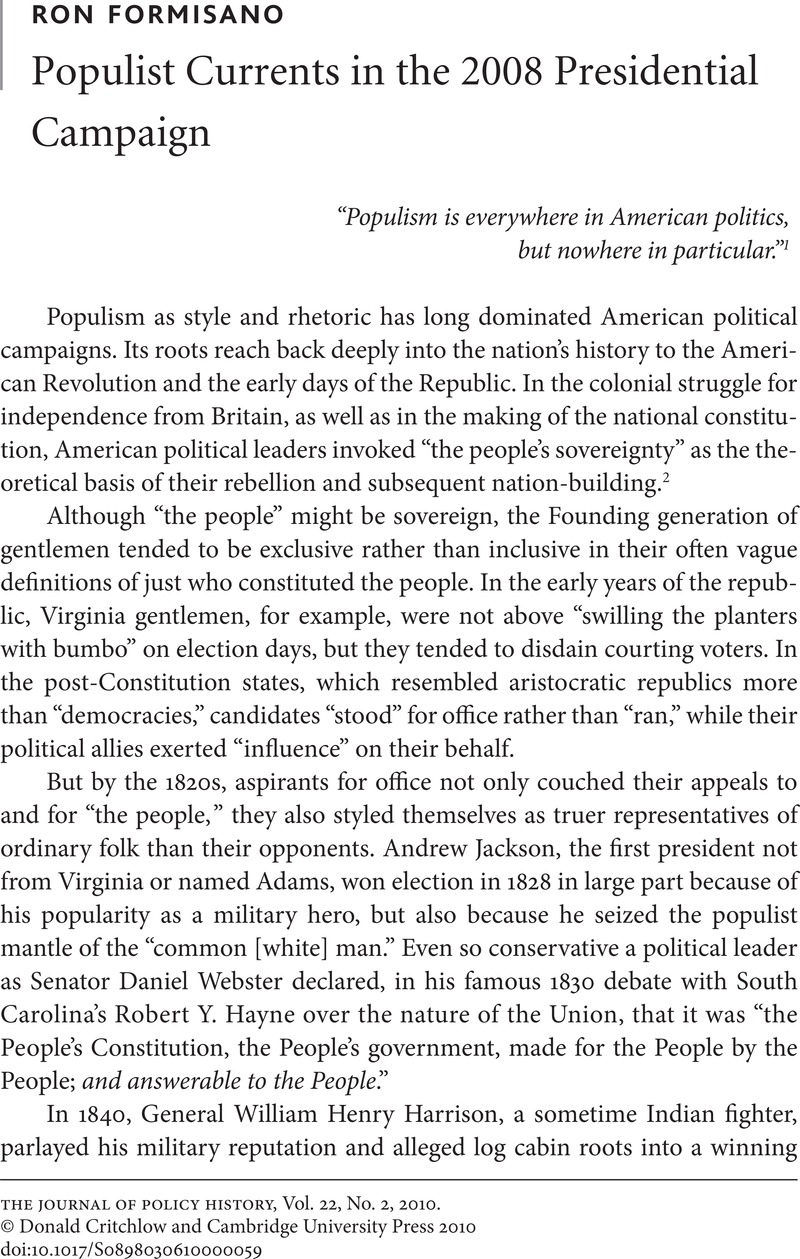Published online by Cambridge University Press: 31 March 2010

1. Ware, Alan, “The United States: Populism as a Political Strategy,” in Democracies and the Populist Challenge, ed. Meny, Yves and Surel, Yves (Houndmills, 2002), 119.Google Scholar
2. Morgan, Edmund S., Inventing the People: The Rise of Popular Sovereignty in England and America (New York, 1988)Google Scholar; Fritz, Christian G., American Sovereigns: The People and America’s Constitutional Tradition Before the Civil War (Cambridge, 2008)Google Scholar.
3. On the former, see Formisano, Ronald P., For the People: American Populist Movements from the Revolution to the 1850s (Chapel Hill, 2008)Google Scholar; for third parties and populist appeals, see Voss-Hubbard, Mark, “The ‘Third Party Tradition’ Reconsidered: Third Parties and American Public Life, 1830–1900,” Journal of American History 86 (June 1999): 121–50.CrossRefGoogle Scholar
4. Hofstadter, Richard, Anti-Intellectualism in American Life (New York, 1963)Google Scholar. “Again and again, but particularly in recent years, it has been noticed that intellect in America is resented as a kind of excellence, as a claim to distinction, as a challenge to egalitarianism, as a quality which almost certainly deprives a man or woman of the common touch” (51).
5. Kazin, Michael, The Populist Persuasion: An American History, rev. ed. (Ithaca, 1998Google Scholar; originally published in 1995), 4; Frank, Thomas, What’s The Matter With Kansas: How Conservatives Won the Heart of America (New York, 2004), 5Google Scholar.
6. Lukacs, John, Democracy and Populism: Fear and Hatred (New Haven, 2005)Google Scholar.
7. Quotations from Peter Gries, “McCain Fleshes Out His Economic Plan,” Christian Science Monitor, 28 April 2008, 2, and Cooper, Michael, “McCain Outlines Broad Proposals for U.S. Economy,” New York Times, 16 April 2008, 1AGoogle Scholar.
8. Thrush, Glenn, “Her Populist Push: Hillary Takes Aim at Gas Prices; Targets Wall St. on the Economy,” Newsday, 6 May 2008, A9Google Scholar.
9. Quotation from Klein, Joe, “The Game Changer,” NewsBank, 19 May 2008Google Scholar.
10. Hawthorne, Christopher, “Critic’s Notebook: Obama Pledges Greek; The Athenian backdrop for his acceptance speech is rife with symbolism,” Los Angeles Times, 30 August 2008, E1Google Scholar. Of course other symbolism was at play: the stadium setting echoed John F. Kennedy’s 1960 convention acceptance speech at the Los Angeles Memorial Coliseum, and Obama’s acceptance came on the anniversary of Martin Luther King Jr.’s 1963 “I Have a Dream” speech.
11. Gerson, Michael, “Starbucks Does Not Equal Savy,” Newsweek, 29 September 2008, 34Google Scholar; Kristol, William, “Here the People Rule,” New York Times, 20 October 2008, A31Google Scholar.
12. Clift, Eleanor, “Palin Reignites the Culture War—Palin, Obama, and the Culture War,” Newsweek Web Exclusive, 3 October 2008Google Scholar. NewsBank infoweb.newsbank.com/iw-search/weInfoWeb.
13. The other major reason for surprise was the expected “Bradley effect,” which failed to materialize, that is, that white voters express more willingness to vote for an African American when polled but vote otherwise when in the privacy of the polling booth.
14. Bartels, Larry M., Unequal Democracy: The Political Economy of the New Gilded Age (Princeton, 2008), 3–4Google Scholar, 66.
15. Rosen, Jeffrey, “Supreme Court Inc.,” New York Times Sunday Magazine, 16 March 2008, 66Google Scholar, 68.
16. Marcus, Ruth, “Pivoting to Populism,” Washington Post, 7 August 2008Google Scholar, Regional Edition, A21; see also Clift, Eleanor, “The Elusive White Male Vote: Edwards, Obama, and Working-Class White Men,” Newsweek, 16 May 2008Google Scholar; Schwartz, Nelson D. and Lohr, Steve, “Looking for Swing Votes in the Boardroom,” New York Times, 17 August 2008, BU1Google Scholar; Zeleny, Jeff, “Obama Looks to Shift Focus of Campaign to Economy,” New York Times, 17 September 2008, A21Google Scholar; Healy, Patrick, “In a Time of Crisis, Is Obama Too Cool?” New York Times 26 September 2008, A18Google Scholar.
17. Howe, Daniel Walker, What Hath God Wrought: The Transformation of America 1815–1848 (New York, 2007, quotation 279, 282)Google Scholar; second quotation, Parsons, Lynn Hudson, The Birth of Modern Politics: Andrew Jackson, John Quincy Adams, and the Election of 1828 (New York, 2009), xviiGoogle Scholar. “John Quincy Adams’s resume may indeed have been impressive, but his defeat … was a signal that in the future such resumes might not be sufficient and indeed might be handicaps. In the same way, his powers of intellect, conceded by friend and foe alike, and which had served him so well as a diplomat, were dismissed as irrelevant to the presidency.” Ibid.
18. Ackerman, Bruce, The Failure of the Founding Fathers: Jefferson, Marshall, and the Rise of Presidential Democracy (Cambridge, 2005), 5–6CrossRefGoogle Scholar. For a view of the “concept of the presidential mandate” originating not with Jefferson but with Jackson, see Ellis, Richard J. and Kirk, Stephen, “Jefferson, Jackson, and the Origins of the Presidential Mandate,” in Speaking to the People: The Rhetorical Presidency in Historical Perspective, ed. Ellis, (Amherst, 1998), 37–40, 47–57Google Scholar. Ellis and Kirk conclude that Jackson’s Whig opposition in rejecting “King Andrew’s” claim of the presidential mandate to speak for the people “were right to deny that in electing presidents ‘the people’ or even the majority of the people could be assumed to have expressed their approval of particular policies espoused by the president. Normatively, they were right to warn that the invention of the presidential mandate posed a threat to representative democracy” (64).
19. Brownstein, Ronald, The Second Civil War: How Extreme Partisanship Has Paralyzed Washington and Polarized America (New York, 2007)Google Scholar.